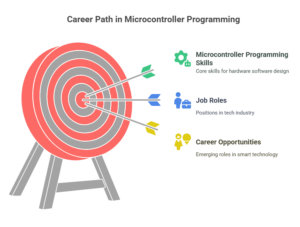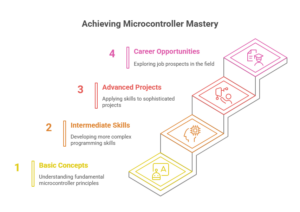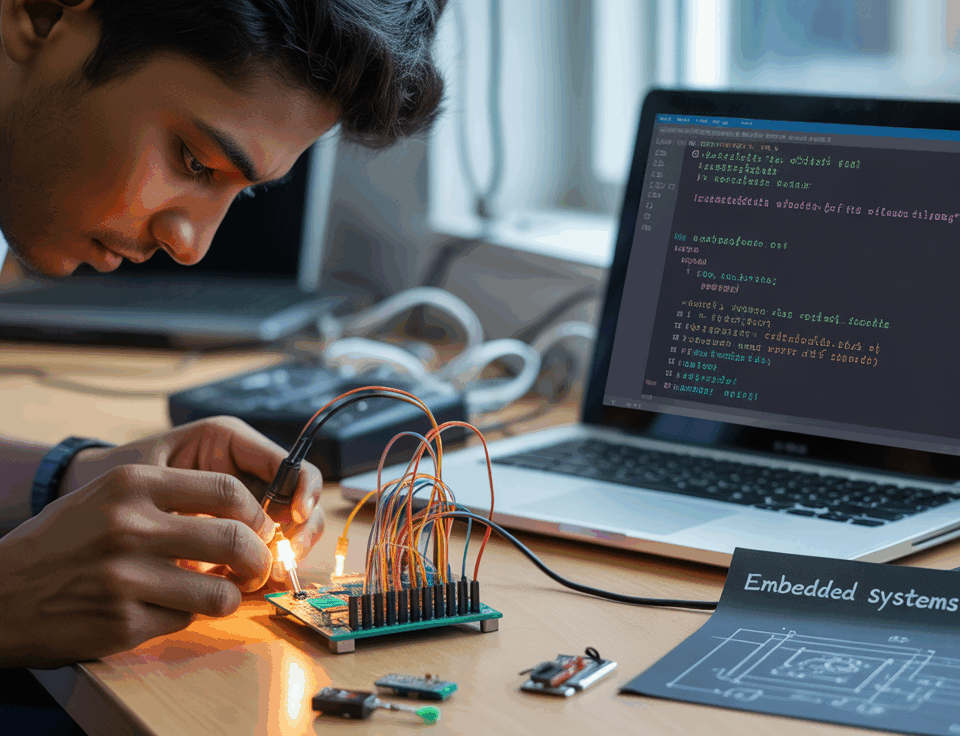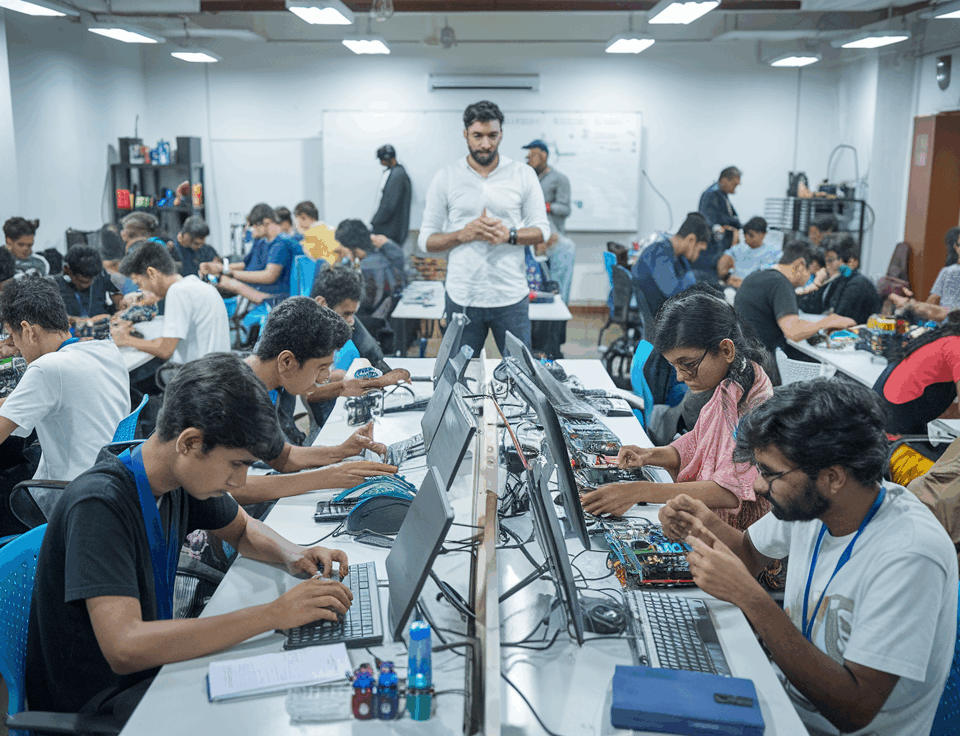
Join the Best IoT Training Institute Near Me in 2025 – Unlock Your Potential with Expert Courses & Certification
March 26, 2025
Unlocking the Future: A Comprehensive Guide to an IoT Course for Beginners
May 5, 2025The microcontroller programming course is essential for students and professionals aiming to build expertise in embedded systems. Microcontrollers are the foundation of modern electronic devices, from household appliances to industrial automation. A well-structured microcontroller programming course equips learners with the knowledge of microcontroller architecture, programming techniques, and real-time embedded applications.
A comprehensive microcontroller programming course typically covers key concepts such as register-level programming, interfacing peripherals, using timers, interrupts, and communication protocols like UART, SPI, and I2C. Through hands-on projects and lab sessions, learners gain practical experience in designing and coding embedded systems, which are crucial for roles in electronics design, robotics, and IoT development. Whether you’re working with 8051, PIC, or ARM-based microcontrollers, this course lays the technical groundwork for building scalable, efficient embedded solutions.
In addition to technical proficiency, the microcontroller programming course also emphasizes debugging techniques, optimization strategies, and real-world implementation. This prepares students not just to write functional code, but to develop reliable, industry-grade embedded systems. With the rising demand for embedded engineers across sectors like automotive, healthcare, and smart consumer electronics, completing a microcontroller programming course opens up diverse and lucrative career opportunities.
Table of Contents
Why Choose a Microcontroller Programming Course?
A microcontroller programming course helps in understanding the working principles of microcontrollers like PIC, ARM, AVR, and 8051. These courses cover programming languages such as C and Python, ensuring that learners gain practical skills in embedded software development. The demand for skilled professionals in embedded systems is continuously increasing, making a microcontroller programming course an ideal choice for career growth.
At Elysium Embedded School, we provide a microcontroller programming course that blends theoretical concepts with hands-on training. Our courses are designed for beginners as well as experienced professionals who want to advance their knowledge in embedded development. Whether you want to work on automotive systems, consumer electronics, or IoT devices, a microcontroller programming course will help you build a strong foundation.
Key Concepts Covered in a Microcontroller Programming Course
A microcontroller programming course is designed to provide in-depth knowledge of embedded systems, microcontroller architecture, programming languages, and real-world applications. Below are some of the key concepts covered in the course:
1. Microcontroller Architecture
Microcontrollers are the backbone of embedded systems, and understanding their architecture is essential for efficient programming. A microcontroller programming course covers various microcontroller families, including:
- 8051 Microcontrollers: One of the oldest and most widely used architectures in industrial automation and consumer electronics.
- AVR Microcontrollers: Known for their high performance and ease of programming, commonly used in robotics and automation.
- PIC Microcontrollers: Used extensively in automotive and medical applications due to their low power consumption and efficiency.
- ARM Microcontrollers: Popular for high-speed processing, commonly used in advanced embedded applications, including IoT and machine learning.
The course explains the internal structure, registers, memory organization, and processing units of these microcontrollers. By learning these fundamentals, students can select the appropriate microcontroller for specific applications and optimize its performance.
2. Embedded C Programming
Programming a microcontroller requires a solid understanding of Embedded C, the most commonly used language for embedded systems. The microcontroller programming course includes:
- Basics of C Programming: Understanding data types, variables, loops, and functions to write efficient code.
- Bitwise Operations: Controlling individual bits of a microcontroller using AND, OR, and XOR operations.
- Memory Management: Efficiently handling stack and heap memory to optimize microcontroller performance.
- Interrupt Handling: Implementing interrupt-driven programming to handle real-time events.
- Timers and Counters: Configuring timers for precise timing operations, such as PWM generation and delay functions.
Embedded C programming enables developers to control microcontrollers effectively and execute real-time tasks efficiently.
3. Interfacing Peripherals
One of the key aspects of a microcontroller programming course is learning how to interface external peripherals with a microcontroller. This includes:
- LCD Display Interface: Displaying data, messages, and graphical elements on LCD screens.
- Sensor Interfacing: Connecting temperature, humidity, pressure, and motion sensors for real-time monitoring.
- Motor Control: Interfacing DC motors, stepper motors, and servo motors for robotics applications.
- Communication Protocols: Learning SPI, I2C, UART, and CAN protocols to connect microcontrollers with other devices.
Understanding peripheral interfacing helps in designing real-time applications such as home automation systems, medical devices, and industrial automation tools.
4. Real-Time Operating Systems (RTOS)
For advanced embedded applications, an RTOS (Real-Time Operating System) is used to manage multiple tasks efficiently. The microcontroller programming course covers:
- Task Scheduling: Managing multiple processes running simultaneously.
- Synchronization and Communication: Implementing semaphores, mutexes, and message queues for task coordination.
- Memory Management in RTOS: Allocating resources efficiently to avoid system crashes and memory leaks.
- Interrupt Handling in RTOS: Ensuring real-time responsiveness of embedded applications.
RTOS is widely used in critical applications such as automotive control systems, medical devices, and aerospace technology, where timing accuracy is crucial.
5. IoT and Embedded Systems
With the growing demand for smart devices, IoT (Internet of Things) has become an essential part of embedded systems. A microcontroller programming course teaches:
- IoT Basics: Understanding how embedded devices communicate over the internet.
- Wireless Communication Protocols: Learning about Wi-Fi, Bluetooth, Zigbee, and LoRaWAN for IoT applications.
- Cloud Integration: Connecting microcontrollers with cloud platforms for remote data monitoring and control.
- Security in IoT: Implementing encryption and authentication techniques to secure IoT devices from cyber threats.
IoT and embedded systems are revolutionizing industries such as smart homes, healthcare, and industrial automation. Learning IoT applications in a microcontroller programming course opens doors to numerous career opportunities.
Career Opportunities After a Microcontroller Programming Course
Completing a microcontroller programming course opens doors to a wide range of career opportunities across multiple industries, including automation, robotics, automotive electronics, consumer electronics, healthcare, and IoT development. As embedded systems continue to evolve, companies seek skilled professionals who can design, develop, and optimize microcontroller-based solutions for real-world applications. A solid foundation in microcontroller programming enables individuals to work in diverse roles that involve designing intelligent systems, enhancing automation processes, and integrating hardware with software for efficient performance.
One of the most sought-after roles is that of an Embedded Software Engineer, where professionals develop and optimize firmware for microcontroller-based systems. These engineers work on programming embedded devices using languages like C and C++, ensuring that the software effectively interacts with the hardware components. Their expertise is crucial in industries such as medical devices, consumer electronics, and smart home automation, where microcontroller-driven applications play a significant role.
Another exciting career path is becoming a Firmware Developer, a role that involves writing low-level code that controls hardware components of embedded systems. Firmware developers work closely with hardware engineers to ensure seamless functionality and performance of devices, from industrial machinery to wearable gadgets. They are responsible for debugging and optimizing microcontroller firmware to enhance system reliability and efficiency.
With the rapid growth of IoT (Internet of Things) applications, the demand for IoT Developers has surged. These professionals specialize in developing smart devices that communicate over networks using microcontrollers and sensors. From designing smart home automation systems to implementing industrial IoT solutions, IoT developers play a key role in bridging the gap between hardware and cloud-based applications. Their expertise is essential in sectors such as healthcare, agriculture, and smart cities, where connected devices improve operational efficiency and data-driven decision-making.
For individuals interested in system-level design, a career as an Embedded Systems Architect is a promising option. These professionals focus on designing the overall architecture of embedded systems, including hardware selection, software integration, and power optimization. Their expertise is crucial in ensuring that embedded solutions meet industry standards, maintain energy efficiency, and deliver high performance in applications such as automotive electronics, aerospace systems, and industrial automation.
Those passionate about automation and intelligent machines can explore a career as a Robotics Engineer. This role involves designing and programming robotic systems that leverage microcontrollers for motion control, sensor data processing, and decision-making. Robotics engineers work on developing autonomous robots, robotic arms for manufacturing, and intelligent automation systems for industrial applications. Their contributions are vital in fields like medical robotics, defense systems, and warehouse automation.
Employers across various sectors prioritize hiring professionals with a strong understanding of microcontroller-based systems and hands-on experience with industry projects. A microcontroller programming course from Elysium Embedded School equips students with practical exposure, enabling them to tackle real-world challenges in embedded technology. With expert training, hands-on labs, and industry-relevant projects, our program ensures that graduates are job-ready and prepared to excel in the fast-growing embedded systems industry. Whether aspiring to develop embedded software, work with IoT technologies, or design cutting-edge robotics, students completing this course have numerous career opportunities waiting for them in the global job market.

Microcontroller Programming Course
Benefits of Taking a Microcontroller Programming Course at Elysium Embedded School
Enrolling in a microcontroller programming course at Elysium Embedded School offers a unique opportunity to gain hands-on expertise in embedded systems. Our training program is designed to provide a strong foundation in microcontroller architecture, Embedded C programming, real-time system development, and IoT applications. With a perfect blend of theoretical knowledge and practical exposure, students can develop the necessary skills to build and implement embedded solutions across various industries.
One of the key advantages of our course is the hands-on training with real-world projects. Rather than focusing solely on theoretical concepts, our curriculum emphasizes practical applications where students work on live projects using microcontroller development boards. This approach enables learners to design, develop, and debug embedded systems efficiently, preparing them for industry-specific challenges. From interfacing sensors and actuators to implementing real-time operating systems, students gain direct experience in building working prototypes, which significantly enhances their problem-solving abilities.
Our program is led by expert faculty with extensive industry experience. The instructors at Elysium Embedded School bring years of expertise in embedded systems, ensuring that students receive guidance from professionals who understand industry trends and challenges. They provide insights into real-world applications, troubleshooting techniques, and the latest advancements in microcontroller technology, making the learning process more comprehensive and effective.
Another major benefit of our microcontroller programming course is the certification upon course completion. A recognized certification from Elysium Embedded School validates the skills and knowledge acquired by students, making them more competitive in the job market. Many employers prioritize candidates with certified training in embedded systems, as it demonstrates their ability to work with microcontrollers and related technologies.
To support a high-quality learning experience, we provide advanced labs equipped with the latest microcontroller kits. Our state-of-the-art lab facilities are designed to give students access to cutting-edge technology, including ARM, AVR, PIC, and 8051 microcontroller kits. These resources help learners practice programming, interfacing, and debugging techniques in a professional environment, ensuring they are well-prepared for industry requirements.
At Elysium Embedded School, we also offer placement assistance to help students secure career opportunities. Our dedicated placement support team collaborates with leading companies in embedded technology, assisting students with job placement, resume building, and interview preparation. Many of our graduates have successfully transitioned into careers as embedded software engineers, firmware developers, and IoT specialists, demonstrating the effectiveness of our training program.
Our microcontroller programming course is structured to provide in-depth knowledge that enables students to develop embedded systems efficiently. With a focus on practical implementation, hands-on training, and industry-relevant skills, we ensure that learners are job-ready in the competitive field of embedded technology. Whether you are a beginner looking to enter the world of embedded systems or a professional aiming to upgrade your skills, our training program equips you with the expertise needed to excel in microcontroller programming and embedded development.

Microcontroller Programming Course
Services Provided by Elysium Embedded School
Embedded Systems Training
Elysium Embedded School offers comprehensive Embedded Systems Training that focuses on real-time hardware and software integration. Students gain hands-on experience with embedded processors, sensors, and communication protocols—equipping them for roles in automation, robotics, and smart devices.
Microcontroller Programming Course
The Microcontroller Programming Course trains learners in programming popular microcontrollers such as PIC, AVR, ARM, and 8051. The curriculum includes interfacing techniques, embedded C programming, and real-world application development—building a solid foundation for embedded systems engineering.
IoT Development Training
This program provides students with in-depth knowledge of IoT architecture, device-to-cloud communication, and real-time data monitoring. With a focus on tools like Raspberry Pi, Arduino, and MQTT, the IoT Development Training prepares students to build smart systems and connected applications.
PCB Design and Development
The PCB Design and Development course teaches the principles of schematic capture, layout design, and multi-layer board fabrication. Learners use industry tools like Eagle and Altium Designer to create professional-grade circuit boards for embedded applications.
RTOS and Embedded C Training
This specialized training introduces Real-Time Operating Systems (RTOS) and low-level embedded C programming. Students learn multitasking, task scheduling, and memory management concepts, making them proficient in developing time-critical embedded applications.
Industrial Automation Training
Through this training, students explore programmable logic controllers (PLCs), SCADA systems, and sensor-based control mechanisms. The Industrial Automation Training course is ideal for those pursuing careers in manufacturing, power systems, and process control industries.
Firmware Development Course
The Firmware Development Course focuses on developing low-level software that directly interfaces with hardware. Students gain expertise in writing, debugging, and testing firmware for embedded devices used in automotive systems, consumer electronics, and more.
FAQs
- What is a microcontroller programming course?
A microcontroller programming course teaches how to program and control microcontrollers used in embedded systems, automation, and IoT devices. - Who can enroll in a microcontroller programming course?
Anyone interested in embedded systems, including students, engineers, and professionals, can take a microcontroller programming course. - What are the prerequisites for a microcontroller programming course?
Basic knowledge of electronics and C programming is helpful but not mandatory for enrolling in a microcontroller programming course. - How long does it take to complete a microcontroller programming course?
The duration of a microcontroller programming course varies from a few weeks to several months, depending on the depth of the course. - Where can I take a microcontroller programming course?
Elysium Embedded School offers a comprehensive microcontroller programming course with hands-on training and certification.
A microcontroller programming course is a gateway to a successful career in embedded technology. With expert guidance, practical training, and industry-recognized certification from Elysium Embedded School, you can achieve excellence in embedded programming.
Certainly! Here’s a 3-paragraph conclusion for a Microcontroller Programming Course, written in a professional tone and optimized with repeated use of the keyword “Microcontroller Programming Course”:
Conclusion
Enrolling in a Microcontroller Programming Course is a strategic step toward mastering the foundational skills needed in embedded systems and electronics design. Whether you’re aiming to develop smart devices, automate machinery, or explore the Internet of Things, this course equips you with the knowledge and tools to bring your ideas to life. From learning how microcontrollers interface with sensors and actuators to writing efficient embedded C code, the Microcontroller Programming Course offers a hands-on learning experience that builds both confidence and capability.
The demand for professionals with microcontroller expertise is growing across industries such as automotive, consumer electronics, industrial automation, and healthcare technology. Completing a Microcontroller Programming Course not only enhances your technical profile but also prepares you for roles like Embedded Systems Developer, Firmware Engineer, IoT Developer, or Robotics Programmer. With strong industry alignment, project-based learning, and real-time application, the course lays a solid foundation for both job seekers and entrepreneurs looking to build hardware-based solutions.
Ultimately, the Microcontroller Programming Course is more than just a technical training program—it’s a launchpad for innovation and career growth. Whether you’re a student, working professional, or hobbyist, this course empowers you to develop smart, efficient, and scalable embedded systems. As microcontroller-based technologies continue to advance, having a deep understanding of programming and integration will make you a valuable asset in the rapidly evolving tech landscape.











